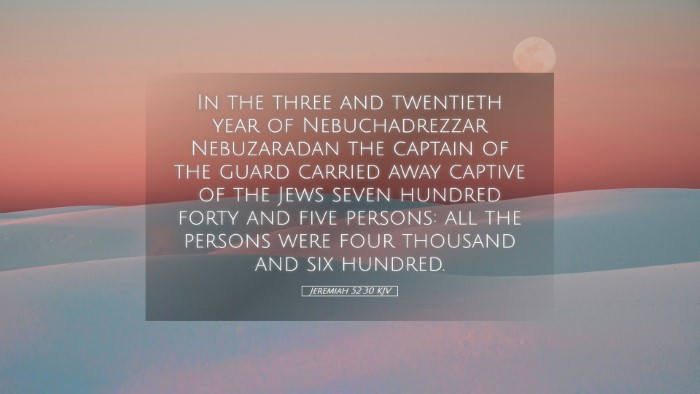Commentary on Jeremiah 52:30
Jeremiah 52:30 states, "In the three and twentieth year of Nebuchadnezzar, the captain of the guard carried away captive of the Jews seven hundred forty and five persons: all the persons were four thousand and six hundred." This verse serves as a conclusive and somber reflection on the judgment of God upon His people and the consequences of their disobedience.
Historical Context
This verse is situated within the historical context of the Babylonian exile, which began in 605 B.C. and lasted until 536 B.C. The figure of Nebuchadnezzar looms large as the king of Babylon during this period, embodying the divine judgment executed through foreign powers. The mention of the "captain of the guard" points to the military authority tasked with the deportation and governance of the conquered peoples.
Commentary Insights
Matthew Henry's Commentary
Matthew Henry emphasizes that this account reveals the precision of God's judgment. He denotes that the captives were taken in three distinct deportations, with this being the final one occurring in the 23rd year of Nebuchadnezzar’s reign. Henry asserts that these events are not only historical but also serve to remind believers of the consequences of persistent sin. He writes:
"The Lord has an eye to His people even in their affliction, and all their captivity is in His hand."
Albert Barnes' Commentary
Albert Barnes provides a detailed analysis of the numerical values given in the text. He notes that the figure of 745 captives reflects the severe losses endured by the nation of Judah. Barnes highlights that the cumulative deportations lead to a total loss of the people, which includes not merely numbers but represents families, lives, and the legacy of a nation. He states:
"These figures illustrate both the severity of the judgment and the profound impact on the community’s future."
Adam Clarke's Commentary
Adam Clarke takes a nuanced approach, suggesting that each deportation carried a significance that transcends mere numbers. Clarke notes that the captives symbolize a broken society with disrupted worship, community, and identity. He cautions readers to recognize that every loss is a lost opportunity for worship and for fulfilling God’s original purposes for Israel:
"The captivity was not just a transportation of bodies but a separation from spiritual heritage that they would struggle to reclaim."
Theological Implications
This verse invites deeper theological reflection on themes such as divine sovereignty, human agency, and the consequences of rebellion against God. The systematic deportations serve as a compelling narrative of how God can use secular powers to fulfill divine purposes, reinforcing His ultimate authority over nations:
- Divine Sovereignty: The verse illustrates that God is sovereign even in the face of human disobedience. His plans are not thwarted by foreign powers; rather, they are accomplished through them.
- Consequences of Sin: The repeated exiles can be seen as emblematic of sin’s consequences. Each deportation signifies a deepening of Israel's estrangement from God due to persistent idolatry and lack of repentance.
- The Remnant: The remnant left behind serves as a focal point for God’s future plans, emphasizing that God preserves a people for Himself, even amidst judgment.
Application for Modern Believers
For pastors, theologians, and students of the scripture, Jeremiah 52:30 serves as a stark reminder of the importance of remaining faithful to God’s covenant. The lessons drawn from this text are crucial for understanding the interplay between judgment and grace. In application, believers are encouraged to:
- Reflect on their own lives to identify areas where they may be resistant to God’s will.
- Engage in communal worship that acknowledges God's sovereignty and judgment.
- Recognize the importance of building a legacy that honors God, avoiding paths leading to spiritual exile.
Conclusion
Jeremiah 52:30 serves not merely as a historical account but as a powerful theological statement reflecting God’s ongoing relationship with His people. It challenges the faithful to heed the lessons of history, cultivating a church that responds to God's call and stands against the tides of cultural compromise.


